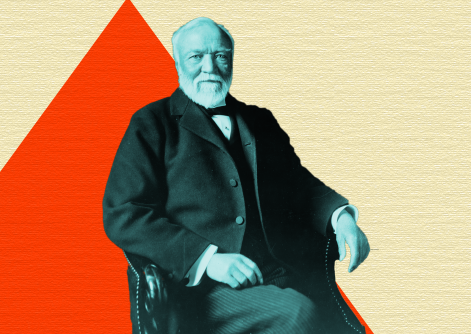Is a “flood” of money into the nonprofit sector a threat to the Republic? Should charities be forced to reveal their donors? Does the public have “a right to know how tax-exempt donations are being used, and by whom”?
Yes, replies David Callahan, in his recent New York Times op-ed, “Bring Donors Out of the Shadows.” Callahan is a co-founder of Demos, “a non-partisan public policy research and advocacy organization,” and he complains that “nonprofit organizations that engage in political advocacy” aren’t forced to reveal their donors.
I criticized several aspects of Callahan’s article in my last post – including the hypocrisy that Demos doesn’t disclose its own donors – but I temporarily set aside the question of requiring donor disclosure because that is more complicated than the other issues Callahan raises.
In general, disclosure for straightforward political giving to parties, candidates, and ballot initiatives seems good for the reason our law already gives: Disclosure helps to avoid the appearance or reality of elected officials’ being bought and sold. I’ve long agreed with this view, although in recent years my confidence has been shaken by such things as the persecution of Mormons who contributed to Prop. 8 in California. (MormonsFor8.com, for example, has a spreadsheet of donors to Prop. 8 and asks you to check a box beside each malefactor to indicate whether the person is an LDS Church member – that’s too close to the Weimar Republic for me.)
Then there’s the issue of disclosing donors who are threatened, not because they are members of a minority religion, but simply because their business may be harmed by vengeful incumbents. Kimberly Strassel of the Wall Street Journal has documented the problem, and more recently, a candidate for U.S. Senate in 2010 described how “dozens of times” during his campaign, potential donors feared to contribute to him because they had a matter pending before a federal agency, or were working with his incumbent opponent on legislation, or were seeking a government grant. The incumbent was not subtle about the danger of showing up on his challenger’s donor list:
Sometimes I was told that someone on my opponent’s staff had called with a reminder that supporting me was not a good idea. Once the call came while I was having lunch with the person from whom I was soliciting support.
These examples strongly suggest that less, not more, disclosure of political donors is called for. The current limit for anonymous giving is $199 and should probably be at least 10 times higher for candidates for federal office. Even the worst bottom-feeding Congressman can’t be purchased for $2,000. (For vigorous arguments against any disclosure of political giving, see the Center for Competitive Politics.)
Moving from straightforward political giving to the murkier world of 501(c)(4) groups, Callahan gripes that the Supreme Court’s Citizens United decision allows corporations to give these entities unlimited amounts without disclosure. Of course, this complaint just shows Callahan’s own partisanship, because he fails to mention that the Court’s decision also gave unions the same unlimited, undisclosed avenue for advocacy. Unions overwhelmingly give to politicians in the political party Callahan prefers, while corporations tend – far less overwhelmingly – to give to the political party he dislikes.
Admittedly, it would be no profound injustice if we adjusted the laws governing the disclosure of donors to (c)(4)s, but as I’ll discuss below, larger issues of “advocacy” and the evolution of political giving are more important.
Turning to the world of 501(c)(3)s, the “public charities” that most people think of when they think of tax-exempt organizations, Callahan demands that the IRS “create a new category for nonprofits engaged in policy advocacy” and force nonprofits that fall into this new category to disclose their donors. Of course, the IRS has no authority to do what Callahan asks (Congress and the President still get to write tax laws), and his advocacy/non-advocacy distinction is hopelessly unworkable.
The best dissection of Callahan’s op-ed on this score is Jack Siegel’s critique at CharityGovernance.com. Siegel is to all appearances a centrist tax lawyer who comes at the issue impartially, and he finds endless snags in any possible scheme to separate charities into Advocacy and Non-advocacy piles. A nonprofit hospital, for instance, could receive the “Advocacy” label if it simply says it won’t perform abortions – or if it says it will.
Siegel also raises the larger question:
Why is political and quasi-political speech considered such an evil commodity that it needs to be singled out for special treatment?
Rick Cohen, Callahan’s erstwhile colleague at the National Committee for Responsive Philanthropy, agrees:
Public policy advocacy is part and parcel of the bundle of free speech rights of all nonprofits, (c)(3)s as well as (c)(4)s – human service delivery organizations as well as Demos-like think tanks.
You’d think a man of the left like Callahan would recall, too, that the leading Supreme Court decision in this area is NAACP v. Alabama, a 1958 case in which Alabama’s Attorney General and state courts tried to force the NAACP to disclose its supporters. The Alabama officials sought to punish this nonprofit civil rights group for its political advocacy, which included its involvement in the Montgomery bus boycott launched by Rosa Parks and its financial and legal assistance to black students who sought admission to the state university.
Luckily for the NAACP, the Supreme Court did not use Callahan’s reasoning to declare that Bull Connor had a right to know the group’s member-donors. Instead, the Court vindicated the nonprofit’s rights to free speech and association, as well as its members’ rights to support it anonymously. The Court saw that disclosure contained “the reasonable likelihood” of causing “diminished financial support and membership.” The Court’s decision could not have been more opposed to Callahan’s views of advocacy and anonymity for nonprofits:
Effective advocacy of both public and private points of view, particularly controversial ones, is undeniably enhanced by group association, as this Court has more than once recognized . . . it is immaterial whether the beliefs sought to be advanced by association pertain to political, economic, religious or cultural matters . . . compelled disclosure of affiliation with groups engaged in advocacy may constitute [an effective] restraint on freedom of association. . . . Inviolability of privacy in group association may in many circumstances be indispensable to preservation of freedom of association, particularly where a group espouses dissident beliefs. . . .
Callahan gives several justifications for his proposal to chill political speech. First he writes:
The Internal Revenue Service doesn’t allow tax filers to write off their donations to politicians or parties, because that would mean Republicans would be subsidizing Democratic political efforts, and vice versa.
This is nonsense three times over. Despite (or because of?) his Ph.D. in politics from Princeton, Callahan is ignorant of the fact that tax law is written by representatives of we the people; the IRS has no authority to decide whether political giving is tax deductible. Callahan is also ignorant of existing tax law, which does not allow tax deductions for charitable giving on the basis he presumes; namely, that Taxpayer A approves of the charities to which Taxpayer B contributes.
Did Callahan, or his Times editors, stop to think how well that theory fits with two neighbors, one deducting gifts to his local Catholic parish and the other deducting gifts to Planned Parenthood?
Callahan makes this mistake because of a still more fundamental error: assuming that every tax deduction is a “subsidy.” That could only be true if all the money in citizens’ hands actually belongs to the government, which then “subsidizes” its peons by allowing them to hold on to a few shekels. As noted in the last post, this view is contradicted as far back as four centuries in Anglo-American law and as recently as the Supreme Court’s Arizona tuition tax credit decision the day after Callahan’s op-ed appeared.
No, Mr. Callahan, tax deductions are permitted on the basis of the purposes of the organizations that enjoy them, as the statute itself makes clear (26 U.S.C. § 501(c)(3)). Americans, God bless them, don’t insist on personally approving of all the particular charitable, educational, religious, scientific, and athletic purposes of the nation’s million-odd charities. They just insist, via the law, that public charities (a) fall into those categories, (b) don’t improperly enrich themselves, and (c) don’t excessively entangle themselves in politics.
Again, the precise parameters of the statute’s political restrictions could be tweaked without grave injustice – both in law and in practice they are a bit fuzzy, and a discussion of their proper boundaries is always worth having. And of course some entities that gain 501(c)(3) status do violate the norms against private enrichment and political involvement and deserve to lose that status.
But none of this changes the fundamentals: Americans have always encouraged a strong charitable sector to exist, have been happy to privilege the sector’s work through tax deductions, have indulgently permitted enormous diversity within the sector, and have never viewed private gifts to charities as “subsidies” from Uncle Sam.
Next Callahan claims “the public has a right to know how tax-exempt donations are being used, and by whom.” I’ve no idea where that “right” is supposed to come from, but I do know Callahan’s colleagues at Demos are violating it. They probably assume, as I do, that full disclosure would dampen support for their work. Bull Connor and his fellow NAACP-haters in Alabama had the same idea. In any event, if the “right to know” exists because every tax deduction is a government subsidy, then the public must have a right to know all charitable donations, not just those to “advocacy” nonprofits.
Callahan adds that the public has “a right not to foot the full bill for political activism by the superwealthy.” Once again he mistakenly presumes that tax-deductible private giving equals government funding, and his goal is to support his final assertion: restrictions on political advocacy are necessary because “the wealthy” are trying “to dominate civic life,” and so “if we care at all about political equality, we must regulate the growing flood of money” into nonprofits.
This view is opposed to the Founders’ understanding of our Constitutional order. As the Federalist Papers explain, our Constitution seeks not equality but diversity as the bulwark of justice. That’s why, instead of imitating the small republics of antiquity, the Founders aimed to create a vast and diverse nation instead. As Madison wrote in Federalist 51:
In the extended republic of the United States, and among the great variety of interests, parties, and sects which it embraces, a coalition of a majority of the whole society could seldom take place on any other principles than those of justice and the general good.
While earlier republics suffered injustices and turmoil from the division between rich and poor, Madison and the other Founders created a diversified commercial republic in which, as Martin Diamond puts it, “rich and poor are fragmented and jumbled together into narrow and particular ‘factions.’” (See Diamond’s The Founding of the Democratic Republic, ch. 3). The plan succeeded, which explains why a socialist party has never gained traction in America – a fact that Marx’s patron Friedrich Engels observed in 1892:
There is no place yet in America for a third party, I believe. The divergence of interests even in the same class group is so great in that tremendous area that wholly different groups and interests are represented in each of the two big parties.
Let’s update the thought so it’s clear for Callahan: “Your think tank gets to support its policy advocacy with greenbacks from currency-trading billionaire George Soros, while the Cato Institute gets to support its advocacy with money from the petro-billionaire Koch brothers.”
Speaking of the two parties, let’s recall the biggest reason why money that once flowed into the coffers of political parties now flows into (c)(3)s, (c)(4)s, and 527 groups: Because of foolish campaign-finance “reforms” pushed by folks like the Pew Charitable Trusts (see here) and, yes, Callahan’s Demos, which devotes an entire section of its website to campaign finance.
To the extent that Callahan’s fears about donors have any merit, we can best encourage money to move out of the shadows and back into the relative sunlight of the parties by scrapping the laws and regulations that have made it increasingly difficult for donors with political goals to give to parties which in turn can support candidates (in our current absurd system, parties can’t “coordinate” expenditures with their own candidates).
Ironically, one unintended consequence of these specious “reforms” has been the sharp increase in the number of “superwealthy” who are elected to office from both parties, because they can contribute unlimited sums to their own campaigns. (For a complete argument on the failure of campaign finance reform, see Peter Wallison and Joel Gora’s excellent Better Parties, Better Government: A Realistic Program for Campaign Finance Reform.)
In lieu of Callahan’s unwise proposals, how about two real reforms:
1. Let political parties once again be convenient receptacles for political giving. Don’t limit their spending, contributions, or “coordination" with candidates, but do have them disclose large donations promptly. This will allow voters to hold parties accountable for their policies and financial support. We could also consider some tightening of the political restrictions on 501(c)(3) groups – I wouldn’t mind forbidding them to register voters – but we would not try to chill their speech. The NAACP had good reasons for “policy advocacy” in 1958 Alabama, and nonprofits today do too.
This arrangement would allow a healthy division of labor: The political parties, which tend to moderate our politics, could specialize in proposing moderate, practical policies, while outside groups, including tax-exempt ones, could specialize in innovative, break-the-mold ideas that, if eventually supported by the public, could then be added to the parties’ platforms.
2. Shrink government, especially at the federal level, significantly. Its obesity already tends to drain citizens’ earnings into taxes instead of charitable giving, and its intrusiveness into every corner of our lives increases the scope of any corruption that does occur. If government favors weren’t so numerous and important, donors wouldn’t fear having their contributions disclosed to powerful incumbents.
In short, let’s have a vigorous and diverse economy supporting a vigorous and diverse charitable sector, alongside a limited government that can easily switch back and forth between the parties as the people hold them accountable.






2 thoughts on “Dam political speech”